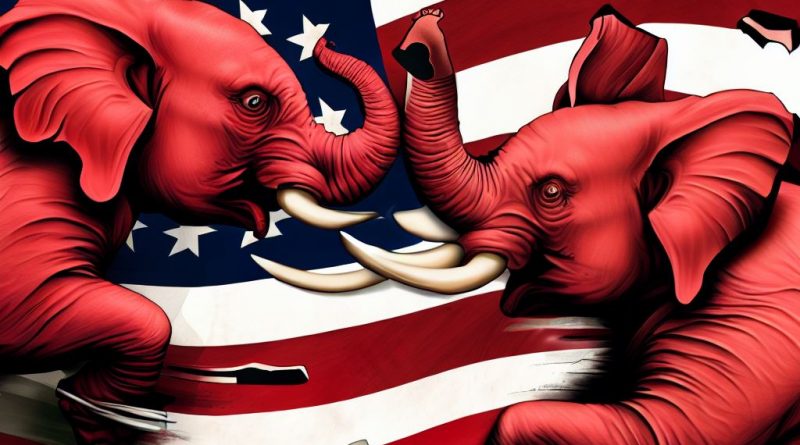The Crisis of Conservatism: An Inherent Lack of Curiosity About the World
In recent times, conservative ideology has dictated a myriad of policy decisions and shaped public discourse, frequently avoiding a deep exploration of the underlying nuances of critical issues. This approach, largely grounded in preserving traditional viewpoints rather than fostering a rich understanding of the world’s complexities, has birthed policies and narratives that are fundamentally flawed and dangerously divisive. This is evident in recent policies that have marginalized various communities, including the LGBTQ+ population, and in attempts to sanitize historical realities in educational curricula. The evidence supporting these critiques is substantial, painting a picture of an ideology rooted more in prejudice than in a curious exploration of the world around them.
LGBTQ+ Rights and the Transgender Community
The conservative approach to LGBTQ+ rights, particularly concerning the transgender community, showcases a glaring lack of curiosity and understanding. Policies such as those seen under Glenn Youngkin’s administration here in Virginia, which instituted a total ban on trans participation in public K-12 school sports, are not grounded in a genuine concern for fairness but are instead a thinly veiled attempt to further marginalize the transgender community. These policies ignore the consensus of numerous medical and psychological associations that affirm the importance of inclusivity for transgender individuals.
Moreover, there has been a concerted effort in many states to ban drag shows and restrict healthcare access for trans individuals, both minors and adults, fostering an environment where the LGBTQ+ community is constantly under siege. These initiatives, documented by organizations such as the ACLU, demonstrate a pervasive attempt to undermine the rights and freedoms of LGBTQ+ individuals, ignoring the vast body of research that supports the inclusion and affirmation of transgender individuals in all aspects of society. The narrative often leverages misinformation and unfounded fears, fostering policies that are discriminatory and foster hostility and mistrust.
Adding to this is the unethical journalism that often supports conservative narratives on this subject. Jesse Singal, a journalist frequently cited by conservatives on trans issues, has faced substantial criticism for his work, which many argue misrepresents the realities faced by transgender individuals by focusing almost exclusively on the tiny fraction of trans individuals who later decide to reverse the transition, often due to social stigma rather than any genuine regrets about the process. The story of Luna, a young transgender girl caught in a custody battle, has also been used as a tool to foster anti-trans sentiments, despite court documents painting a more nuanced picture that contradicts the narrative pushed by conservative commentators. This kind of misinformation not only fosters policies that are discriminatory but also creates an environment of hostility and mistrust, undermining the principles of inclusivity and human rights.
Misrepresentation of History
The 1776 Commission, established during the Trump administration, stands as a testament to the conservative tendency to shy away from the complex realities of American history. The report produced by the commission is riddled with inaccuracies and misrepresentations that foster a divisive view of modern politics.
For instance, the report draws a false equivalence between the fight against slavery and the fight against “socialism,” a comparison that not only undermines the gravity of the struggles endured by enslaved individuals but also misrepresents the complex dynamics of modern political ideologies. Furthermore, it dismisses the relevance and impact of progressive movements, including the fight for civil rights, framing them as divergences from the country’s founding principles rather than as efforts to fulfill the promises of freedom and equality outlined in the nation’s founding documents.
The report also portrays the founders as demigods, overlooking the significant moral and philosophical contradictions they embodied, such as owning slaves while preaching liberty. This sanitized and idealized version of history bypasses critical discussions on slavery and systemic racism, promoting a narrative that aligns with preconceived notions of how things “should be.” This approach fails to foster a curious exploration of the rich and diverse tapestry of American history, instead opting for a narrative that supports a narrow worldview, ignoring the multifaceted experiences and contributions of marginalized communities throughout history.
The Fatherlessness Narrative
Mississippi State Auditor Shad White’s report on “fatherlessness” in Mississippi is another stark example of the conservative reluctance to delve deeply into complex social issues. The report largely overlooks systemic issues such as economic instability and educational disparities, focusing instead on a narrow view of family structure. As with many other conservative writings on social issues, the report showcases a failure to ask “why,” to delve into the economic, educational, and systemic factors at play.
White suggests a strong correlation between fatherlessness and higher incarceration rates, particularly among boys, translating to a taxpayer burden of approximately $180 million per year as of fiscal year 2020. While these statistics are indeed alarming, the report fails to explore the underlying causes of fatherlessness, such as economic instability, educational disparities, and systemic racism, which are often intertwined with higher rates of incarceration.
The report further highlights the educational setbacks faced by children from fatherless homes, emphasizing a decreased likelihood of high school graduation and the subsequent economic repercussions. It estimates a loss of $560 million to taxpayers due to fatherless students dropping out of school in the 2021-2022 academic year alone. However, it does not consider the role of underfunded schools, lack of access to educational resources, and other systemic barriers that often play a crucial role in educational attainment.
White also addresses the experiences of fatherless girls, suggesting a higher likelihood of teenage pregnancy in this demographic. However, this perspective fails to consider the multifaceted reasons behind teenage pregnancies, including lack of access to comprehensive sex education and healthcare resources. Moreover, it overlooks the potential role of community, extended family, and other forms of support systems that can positively influence a child’s upbringing.
The report touches upon the cyclical nature of fatherlessness, emphasizing that children from fatherless homes are more likely to enter the juvenile justice system and later the adult criminal justice system, perpetuating a cycle of fatherlessness in their own families. While this cycle is a pressing issue, the report does not sufficiently explore the potential positive outcomes that can emerge from single-parent households, where a single parent, be it a father or a mother, provides a nurturing and supportive environment for the child. It also fails to address the possibility of having an abusive parent, instead singing the praises of the “nuclear family” regardless of the circumstances.
Interestingly, White had previously investigated the misuse of TANF funds in Mississippi, including the diversion of millions of taxpayer dollars earmarked for the poorest of the poor in America’s poorest state to wealthy conservatives like Brett Farve for pet projects, a probe that should have informed a more nuanced understanding of the socioeconomic factors contributing to “fatherlessness.” However, due to the limitations inherent in the conservative ideology, this opportunity for a deeper understanding was missed, promoting a simplistic narrative that lacks nuance and depth.
The Abortion Debate
The recent restrictive abortion laws, a direct consequence of the highly contentious conservative-driven overturning of Roe v. Wade, have ignited fierce debates on bodily autonomy and individual rights. The conservative stance in this debate often disregards the complex realities faced by pregnant individuals, including health risks and economic instability, imposing severe restrictions on their ability to access abortion services. This approach fails to respect individual autonomy, creating a legal and ethical quagmire that undermines the principles of human rights and equality.
In Texas, the recent abortion ban has had devastating effects, with clinics closing and individuals being forced to travel out of state, sometimes hundreds of miles, to access abortion services. This not only places a significant burden on individuals seeking abortion services but also creates a healthcare crisis, with services being overwhelmed and unable to meet the demand. The evidence clearly shows the negative impacts of such restrictive policies, highlighting the need for a more nuanced and compassionate approach to reproductive rights.
Grievance Politics
Conservative ideology often engages in “grievance politics,” leveraging pre-existing biases and stereotypes to further marginalize historically oppressed communities. This approach fosters division and hostility, creating deep rifts in society.
A significant aspect of this strategy involves conflating unearned privileges with human rights. This is seen in leveraging “religious freedom” as a means to justify the violation of the rights of LGBT+ individuals and women, effectively using it as a shield to uphold discriminatory practices and policies, such as denying service based on sexual orientation. This misrepresentation of “religious freedom” showcases a deep-seated unwillingness to differentiate between the protection of individual rights and the granting of privileges that enable discrimination, further illustrating the lack of depth and understanding in conservative ideology.
Ron DeSantis and the Reshaping of Florida’s Educational Landscape
Recent initiatives by Florida Governor Ron DeSantis have raised serious concerns regarding the trajectory of education in the state. Changes to Florida’s K-12 curriculum under DeSantis’ administration have sanitized the history of slavery, presenting it as a mere “necessary evil” in the nation’s history. This move, which has been widely criticized by historians and educators, distorts historical realities and fails to provide students with a nuanced understanding of the country’s past, thereby promoting a divisive view of modern politics.
Moreover, DeSantis’ influence extends to higher education, with the appointment of conservative activist Christopher Rufo (who has no experience in education) to oversee the New College of Florida. This appointment has fostered an environment where conservative ideology is being pushed aggressively, to the detriment of academic freedom and the rich diversity of thought that is essential in educational settings. These moves represent a dangerous politicization of education, where Rufo’s “anti-woke” ideology trumps evidence and critical inquiry, further showcasing the conservative reluctance to foster a curious and open-minded exploration of complex issues.
Conclusion
The current state of conservative ideology presents a crisis characterized by a lack of curiosity about the world and a reluctance to engage deeply with complex societal issues. The substantial evidence supporting these critiques paints a picture of an ideology rooted in prejudice and a failure to foster a rich understanding of the world’s complexities. It is a call for a more nuanced approach that goes beyond surface-level narratives, urging for a discourse grounded in evidence, rational analysis, and a deep understanding of the complex dynamics at play in ideological debates. It is imperative that conservative ideology evolves to meet these critiques head-on, fostering a discourse that respects the dignity and rights of all individuals while navigating the complex realities of modern society. The current trajectory, characterized by a lack of curiosity and a reluctance to delve into the nuances of pressing issues, threatens to foster a society more divided and less informed.

